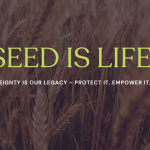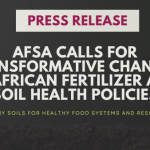Healthy Soils for Healthy Food Systems and Resilience
We make this statement on behalf of 41 African farmers’ organizations, African NGO networks, specialist African NGOs, faith-based institutions, consumer movements, international organizations and individuals that support the stance of AFSA. The members represent over 200 million smallholder farmers, pastoralists, hunter/gatherers, indigenous peoples, environmentalists, women, youth groups and agroecological entrepreneurs from across Africa.
Context: The African Union and the Government of Kenya will host the Africa Fertilizer & Soil Health Summit in Nairobi from 7-9 May 2024. The Objective of the Summit is to “bring together all relevant stakeholders to highlight the crucial role of fertilizer and soil health in stimulating sustainable pro-poor productivity growth in African agriculture and to agree on a 10-year African Fertilizer and Soil Health Action Plan, as well as the Soils Initiative for Africa.” The proposed 10-year action plan aims to “significantly increase investments in the local manufacturing and distribution of mineral and organic fertilizers, biofertilizers and biostimulants” and to “triple fertilizer use from 18 kg/ha in 2020 nutrients to 54 kg/ha in 2033.”
The Soil Problem: Soil degradation is increasing in the region, with over 20 per cent of land in most African countries already being degraded, affecting over 65 per cent of the population and resulting in significant adverse effects on food production and human livelihoods. Reported yield losses range from moderate (two per cent decline over several decades) to catastrophic levels (more than 50 per cent), depending on crop, soil type, climate, and production systems, with most studies reporting significant losses (UN FAO). Soils across Africa are seriously depleted. They have lost organic matter and are often bare and sometimes capped like concrete. They are missing the highly diverse microbial life in healthy natural soils. There is an urgent need for proactive interventions to arrest and reverse soil degradation. Agricultural lands are especially prone to erosion and nutrient depletion.
Our Analysis: While the Alliance for Food Sovereignty in Africa recognizes and commends the AU’s commitment to reversing soil degradation and addressing hunger, malnutrition, and poverty, we hold significant reservations. We fundamentally disagree with the vision and strategies outlined, which not only misinterpret the underlying challenges of soil health and fertility but also perpetuate outdated Green Revolution solutions that fail to address—and may exacerbate—the degradation of soil fertility in Africa. These approaches risk further endangering food security, deteriorating public health, and depleting our crucial seed diversity, which forms the cornerstone of food sovereignty and resilience. The 10-year action plan regrettably misses a critical opportunity for transformative change, bypassing a necessary shift towards agroecology—a bold African solution that champions food sovereignty and climate justice.
Top-down master planning: The formulation of the 10-year action plan has largely excluded farmers, civil society organizations, and agroecology practitioners, who are on the front lines of sustainable agriculture in Africa. The absence of these voices leads to policies that are disconnected from on-ground realities and the needs of the majority. They ignore local culture, indigenous knowledge, and the concept of the right to food.
Dependency on imported agro inputs: The 10-year action plan’s emphasis on mineral fertilizers perpetuates a cycle of dependency that undermines local seed diversity and ecological resilience. The push for fertilizers comes with a parallel push for hybrid seeds, which are often designed to perform in artificially enhanced soil conditions, thereby diminishing the use of diverse indigenous seed varieties better suited to local conditions and crucial for resilience, food security and ecological diversity. Synthetic fertilizers cause nitrate pollution and depend on high energy use. They kill beneficial microorganisms, leach into groundwater, increase toxicity, and cause damage to respiratory systems. Plants that grow in overly fertilised soils are nutrient deficient. As farmers struggle to cope with increased fertilizer prices, the world’s nine largest fertiliser companies are making record profits, up more than fourfold in 2022 compared to two years earlier.
Marginalization of agroecological solutions: Agroecology is incompatible with synthetic fertilizers; it is a comprehensive approach that integrates local knowledge with scientific innovation to create resilient food systems. The 10-year action plan’s superficial endorsement of biofertilizers seems like a tactic to make aggressive corporate fertilizer agendas more palatable without committing to real change.
Economic Burden: The heavy financial burden placed on African nations to support the purchase of expensive, imported fertilizers drains local economies and diverts funds from more sustainable, local agricultural investments. This economic strain is exacerbated by a planning process influenced by external actors like the Alliance for a Green Revolution in Africa (AGRA), which benefits the global agrochemical corporations by maintaining the status quo of import-dependent agriculture.
RECOMMENDATIONS
Focus on agroecology: We call upon governments and policymakers to recognize and value the enormous potential of agroecology to sustainably increase food security and food sovereignty, reducing poverty and hunger while conserving biodiversity and respecting indigenous knowledge and innovation. Data shows that these systems can compete with industrial agriculture in terms of total outputs, performing particularly strongly under environmental stress, and delivering production increases in the places where additional food is desperately needed. Diversified agroecological systems can also pave the way for diverse diets and improved health. We call upon development partners to refocus their resources towards agroecology. We call upon researchers to refocus their studies towards agroecology.
Invest in agroecological research and extension services: Policymakers should allocate funding for agroecological research and extension services that support sustainable farming practices, biodiversity conservation, and climate resilience. This includes promoting participatory research methods that engage farmers in co-creating knowledge and adapting agricultural techniques to local contexts.
Promote bio-fertilizer production and phase out imported chemical fertilizers: Rapidly replace chemical fertilizers with agroecological bio-inputs and organic fertilizers, taking advantage of the current scarcity of imported chemical fertilizers as an opportunity for African countries to promote domestic bio/agroecological-fertilizer production rather than increasing their indebtedness by taking out loans to finance continued dependence on fertilizer imports.
Involve Farmers and Civil Society: Farmers and civil society must be part of developing agriculture strategy to ensure that plans respond to the real needs and contexts of small-scale farmers at the heart of the food system.
In conclusion, AFSA calls for a complete overhaul of the 10-year Fertilizer and Soil Health Action Plan to focus on policies that genuinely empower farmers, protect biodiversity, and build resilient food systems through agroecological and locally adapted practices. Only through such transformative changes can we ensure the long-term sustainability and sovereignty of Africa’s food systems.
###
ABOUT AFSA
The Alliance for Food Sovereignty in Africa (AFSA) is a continental coalition of civil society organizations dedicated to advancing the causes of food sovereignty and agroecology across the African continent. Our alliance comprises diverse entities, including African food producer networks, African CSO networks, indigenous people’s organizations, faith-based organizations, women and youth groups, consumer movements, and international organizations aligned with AFSA’s mission. AFSA is a ‘network of networks’ with 41 member organizations active in 50 African countries, impacting approximately 200 million individuals.


































[…] READ THE FULL AFSA STATEMENT HERE […]
[…] adherence to a flawed model that has consistently failed to alleviate hunger and malnutrition, a concern shared by the Alliance for Food Sovereignty in Africa, which represents more than 200 million […]